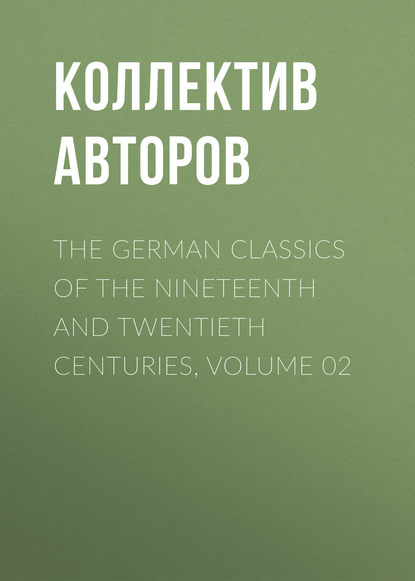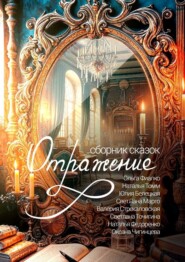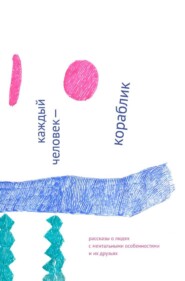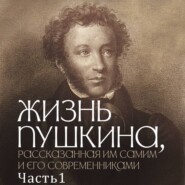По всем вопросам обращайтесь на: info@litportal.ru
(©) 2003-2025.
✖
The German Classics of the Nineteenth and Twentieth Centuries, Volume 02
Настройки чтения
Размер шрифта
Высота строк
Поля
"Variety, without dissipation, were the best motto for both teaching and life, if this desirable equipoise were easy to be preserved," said the Assistant; and he was going on further with the subject, when Charlotte called out to him to look again at the children, whose merry troop were at the moment moving across the court. He expressed his satisfaction at seeing them wearing a uniform. "Men," he said, "should wear a uniform from their childhood upwards. They have to accustom themselves to work together; to lose themselves among their equals; to obey in masses, and to work on a large scale. Every kind of uniform, moreover, generates a military habit of thought, and a smart, straight-forward carriage. All boys are born soldiers, whatever you do with them. You have only to watch them at their mock fights and games, their storming parties and scaling parties."
"On the other hand, you will not blame me," replied Ottilie, "if I do not insist with my girls on such unity of costume. When I introduce them to you, I hope to gratify you by a parti-colored mixture."
"I approve of that, entirely," replied the other. "Women should go about in every sort of variety of dress; each following her own style and her own likings, that each may learn to feel what sits well upon her and becomes her. And for a more weighty reason as well—because it is appointed for them to stand alone all their lives, and work alone."
"That seems to me to be a paradox," answered Charlotte. "Are we then to be never anything for ourselves?"
"O, yes!" replied the Assistant. "In respect of other women assuredly. But observe a young lady as a lover, as a bride, as a housewife, as a mother. She always stands isolated. She is always alone, and will be alone. Even the most empty-headed woman is in the same case. Each one of them excludes all others. It is her nature to do so; because of each one of them is required everything which the entire sex have to do. With a man it is altogether different. He would make a second man if there were none. But a woman might live to an eternity, without even so much as thinking of producing a duplicate of herself."
"One has only to say the truth in a strange way," said Charlotte, "and at last the strangest thing will seem to be true. We will accept what is good for us out of your observations, and yet as women we will hold together with women, and do common work with them too; not to give the other sex too great an advantage over us. Indeed, you must not take it ill of us, if in future we come to feel a little malicious satisfaction when our lords and masters do not get on in the very best way together."
With much care, this wise, sensible person went on to examine more closely how Ottilie proceeded with her little pupils, and expressed his marked approbation of it. "You are entirely right," he said, "in directing these children only to what they can immediately and usefully put in practice. Cleanliness, for instance, will accustom them to wear their clothes with pleasure to themselves; and everything is gained if they can be induced to enter into what they do with cheerfulness and self-reflection."
In other ways he found, to his great satisfaction, that nothing had been done for outward display; but all was inward, and designed to supply what was indispensably necessary. "In how few words," he cried, "might the whole business of education be summed up, if people had but ears to hear!"
"Will you try whether I have any ears?" said Ottilie, smiling.
"Indeed I will," answered he, "only you must not betray me. Educate the boys to be servants, and the girls to be mothers, and everything is as it should be."
"To be mothers?" replied Ottilie. "Women would scarcely think that sufficient. They have to look forward, without being mothers, to going out into service. And, indeed, our young men think themselves a great deal too good for servants. One can see easily, in every one of them, that he holds himself far fitter to be a master."
"And for that reason we should say nothing about it to them," said the Assistant. "We flatter ourselves on into life; but life flatters not us. How many men would like to acknowledge at the outset, what at the end they must acknowledge whether they like it or not? But let us leave these considerations, which do not concern us here.
"I consider you very fortunate in having been able to go so methodically to work with your pupils. If your very little ones run about with their dolls, and stitch together a few petticoats for them; if the elder sisters will then take care of the younger, and the whole household know how to supply its own wants, and one member of it help the others, the further step into life will not then be great, and such a girl will find in her husband what she has lost in her parents.
"But among the higher ranks the problem is a sorely intricate one. We have to provide for higher, finer, more delicate relations; especially for such as arise out of society. We are, therefore, obliged to give our pupils an outward cultivation. It is indispensable, it is necessary, and it may be really valuable, if we do not overstep the proper measure in it. Only it is so easy, while one is proposing to cultivate the children for a wider circle, to drive them out into the indefinite, without keeping before our eyes the real requisites of the inner nature. Here lies the problem which more or less must be either solved or blundered over by all educators.
"Many things, with which we furnish our scholars at the school, do not please me; because experience tells me of how little service they are likely to be in after-life. How much is in a little while stripped off; how much at once committed to oblivion, as soon as the young lady finds herself in the position of a housewife or a mother!
"In the meantime, since I have devoted myself to this occupation, I cannot but entertain a devout hope that one day, with the companionship of some faithful helpmate, I may succeed in cultivating purely in my pupils that, and that only, which they will require when they pass out into the field of independent activity and self-reliance; that I may be able to say to myself, in this sense is their education completed. Another education there is indeed which will again speedily recommence, and work on well nigh through all the years of our life—the education which circumstances will give us, if we do not give it to ourselves."
How true Ottilie felt were these words! What had not a passion, little dreamed of before, done to educate her in the past year! What trials did she not see hovering before her if she looked forward only to the next—to the very next, which was now so near!
It was not without a purpose that the young man had spoken of a helpmate—of a wife; for with all his diffidence, he could not refrain from thus remotely hinting at his own wishes. A number of circumstances and accidents, indeed, combined to induce him on this visit to approach a few steps toward his aim.
The Lady Superior of the school was advanced in years. She had been already for some time looking about among her fellow-laborers, male and female, for some person whom she could take into partnership with herself, and at last had made proposals to the Assistant, in whom she had the highest ground for feeling confidence. He was to conduct the business of the school with herself. He was to work with her in it, as if it was his own; and after her death, as her heir, to enter upon it as sole proprietor.
The principal thing now seemed to be, that he should find a wife who would cooperate with him. Ottilie was secretly before his eyes and before his heart. A number of difficulties suggested themselves, and yet again there were favorable circumstances on the other side to counterbalance them. Luciana had left the school; Ottilie could therefore return with the less difficulty. Of the affair with Edward, some little had transpired. It passed, however, as many such things do, as a matter of indifference, and this very circumstance might make it desirable that she should leave the castle. And yet, perhaps, no decision would have been arrived at, no step would have been taken, had not an unexpected visit given a special impulse to his hesitation. The appearance of remarkable people, in any and every circle, can never be without its effects.
The Count and the Baroness, who often found themselves asked for their opinion, almost every one being in difficulty about the education of their children, as to the value of the various schools, had found it desirable to make themselves particularly acquainted with this one, which was generally so well spoken of; and under their present circumstances, they were more easily able to carry on these inquiries in company.
The Baroness, however, had something else in view as well. While she was last at the castle, she had talked over with Charlotte the whole affair of Edward and Ottilie. She had insisted again and again that Ottilie must be sent away. She tried every means to encourage Charlotte to do it, and to keep her from being frightened by Edward's threats. Several modes of escape from the difficulty were suggested. Accidentally the school was mentioned, and the Assistant and his incipient passion, which made the Baroness more resolved than ever to pay her intended visit there.
She went; she made acquaintance with the Assistant; looked over the establishment, and spoke of Ottilie. The Count also spoke with much interest of her, having in his recent visit learnt to know her better. She had been drawn toward him; indeed, she had felt attracted by him; believing that she could see, that she could perceive in his solid, substantial conversation, something to which hitherto she had been an entire stranger. In her intercourse with Edward, the world had been utterly forgotten; in the presence of the Count, the world appeared first worth regarding. The attraction was mutual. The Count conceived a liking for Ottilie; he would have been glad to have had her for a daughter. Thus a second time, and worse than the first time, she was in the way of the Baroness. Who knows what, in times when passions ran hotter than they do now-a-days, this lady might not have devised against her? As things were, it was enough if she could get her married, and render her more innocuous for the future to the peace of mind of married women. She therefore artfully urged the Assistant, in a delicate, but effective manner, to set out on a little excursion to the castle; where his plans and his wishes, of which he made no secret to the lady, he might forthwith take steps to realize.
With the fullest consent of the Superior he started off on his expedition, and in his heart he nourished good hopes of success. He knew that Ottilie was not ill-disposed toward him; and although it was true there was some disproportion of rank between them, yet distinctions of this kind were fast disappearing in the temper of the time. Moreover, the Baroness had made him perceive clearly that Ottilie must always remain a poor, portionless maiden. To be related to a wealthy family, it was said, could be of service to nobody. For even with the largest property, men have a feeling that it is not right to deprive of any considerable sum, those who, as standing in a nearer degree of relationship, appear to have a fuller right to possession; and really it is a strange thing, that the immense privilege which a man has of disposing of his property after his death, he so very seldom uses for the benefit of those whom he loves, only out of regard to established usage appearing to consider those who would inherit his estate from him, supposing he made no will at all.
Thus, while on his journey, he grew to feel himself entirely on a level with Ottilie. A favorable reception raised his hopes. He found Ottilie indeed not altogether so open with him as usual, but she was considerably matured, more developed, and, if you please, generally more conversible than he had known her. She was ready to give him the fullest insight into many things which were in any way connected with his profession; but when he attempted to approach his proper object, a certain inward shyness always held him back.
Once, however, Charlotte gave him an opportunity for saying something. In Ottilie's presence she said to him, "Well now, you have looked closely enough into everything which is going forward in my circle. How do you find Ottilie? You had better say while she is here."
Hereupon the Assistant signified, with a clear perception and composed expression, how that, in respect of a freer carriage, of an easier manner in speaking, of a higher insight into the things of the world, which showed itself more in actions than in words, he found Ottilie altered much for the better; but that he still believed it might be of serious advantage to her if she would go back for some little time to the school, in order methodically and thoroughly to make her own forever what the world was only imparting to her in fragments and pieces, rather perplexing her than satisfying her, and often too late to be of service. He did not wish to be prolix about it. Ottilie herself knew best how much method and connection there was in the style of instruction out of which, in that case, she would be taken.
Ottilie had nothing to say against this; she could not acknowledge what it was which these words made her feel, because she was hardly able to explain it to herself. It seemed to her as if nothing in the world was disconnected so long as she thought of the one person whom she loved; and she could not conceive how, without him, anything could be connected at all.
Charlotte replied to the proposal with a wise kindness. She said that she herself, as well as Ottilie, had long desired her return to the school. At that time, however, the presence of so dear a companion and helper had become indispensable to herself; still she would offer no obstacle at some future period, if Ottilie continued to wish it, to her going back there for such a time as would enable her to complete what she had begun, and to make entirely her own what had been interrupted.
The Assistant listened with delight to this qualified assent. Ottilie did not venture to say anything against it, although the very thought made her shudder. Charlotte, on her side, thought only how to gain time. She hoped that Edward would soon come back and find himself a happy father; then she was convinced all would go right; and one way or another they would be able to settle something for Ottilie.
After an important conversation which has furnished matter for after-reflection to all who have taken part in it, there commonly follows a sort of pause, which in appearance is like a general embarrassment. They walked up and down the saloon. The Assistant turned over the leaves of various books, and came at last on the folio of engravings which had remained lying there since Luciana's time. As soon as he saw that it contained nothing but apes, he shut it up again.
It may have been this, however, which gave occasion to a conversation of which we find traces in Ottilie's diary.
FROM OTTILIE'S DIARY
"It is strange how men can have the heart to take such pains with the pictures of those hideous monkeys. One lowers one's-self sufficiently when one looks at them merely as animals, but it is really wicked to give way to the inclination to look for people whom we know behind such masks."
"It is a sure mark of a certain obliquity, to take pleasure in caricatures and monstrous faces, and pigmies. I have to thank our kind Assistant that I have never been vexed with natural history; I could never make myself at home with worms and beetles."
"Just now he acknowledged to me, that it was the same with him. 'Of nature,' he said, 'we ought to know nothing except what is actually alive immediately around us. With the trees which blossom and put out leaves and bear fruit in our own neighborhood, with every shrub which we pass by, with every blade of grass on which we tread, we stand in a real relation. They are our genuine compatriots. The birds which hop up and down among our branches, which sing among our leaves, belong to us; they speak to us from our childhood upward, and we learn to understand their language. But let a man ask himself whether or not every strange creature, torn out of its natural environment, does not at first sight make a sort of painful impression upon him, which is only deadened by custom. It is a mark of a motley, dissipated sort of life, to be able to endure monkeys, and parrots, and black people, about one's self."
"Many times when a certain longing curiosity about these strange objects has come over me, I have envied the traveler who sees such marvels in living, everyday connection with other marvels. But he, too, must have become another man. Palm-trees will not allow a man to wander among them with impunity; and doubtless his tone of thinking becomes very different in a land where elephants and tigers are at home."
"The only inquirers into nature whom we care to respect, are such as know how to describe and to represent to us the strange wonderful things which they have seen in their proper locality, each in its own especial element. How I should enjoy once hearing Humboldt talk!"
"A cabinet of natural curiosities we may regard like an Egyptian burying-place, where the various plant gods and animal gods stand about embalmed. It may be well enough for a priest-caste to busy itself with such things in a twilight of mystery. But in general instruction, they have no place or business; and we must beware of them all the more, because what is nearer to us, and more valuable, may be so easily thrust aside by them."
"A teacher who can arouse a feeling for one single good action, for one single good poem, accomplishes more than he who fills our memory with rows on rows of natural objects, classified with name and form. For what is the result of all these, except what we know as well without them, that the human figure preëminently and peculiarly is made in the image and likeness of God?"
"Individuals may be left to occupy themselves with whatever amuses them, with whatever gives them pleasure, whatever they think useful; but 'the proper study of mankind is man.'"
CHAPTER VIII
There are but few men who care to occupy themselves with the immediate past. Either we are forcibly bound up in the present, or we lose ourselves in the long gone-by, and seek back for what is utterly lost, as if it were possible to summon it up again, and rehabilitate it. Even in great and wealthy families who are under large obligations to their ancestors, we commonly find men thinking more of their grandfathers than their fathers.
Such reflections as these suggested themselves to our Assistant, as, on one of those beautiful days in which the departing winter is accustomed to imitate the spring, he had been walking up and down the great old castle garden, and admiring the tall avenues of the lindens, and the formal walks and flower-beds which had been laid out by Edward's father. The trees had thriven admirably, according to the design of him who had planted them, and now when they ought to have begun to be valued and enjoyed, no one ever spoke of them. Hardly any one even went near them, and the interest and the outlay was now directed to the other side, out into the free and the open.
He remarked upon it to Charlotte on his return; she did not take it unkindly. "While life is sweeping us forward," she replied, "we fancy that we are acting out our own impulses; we believe that we choose ourselves what we will do, and what we will enjoy. But in fact, if we look at it closely, our actions are no more than the plans and the desires of the time which we are compelled to carry out."
"No doubt," said the Assistant. "And who is strong enough to withstand the stream of what is around him? Time passes on, and in it, opinions, thoughts, prejudices, and interests. If the youth of the son falls in the era of revolution, we may feel assured that he will have nothing in common with his father. If the father lived at a time when the desire was to accumulate property, to secure the possession of it, to narrow and to gather one's-self in, and to base one's enjoyment in separation from the world, the son will at once seek to extend himself, to communicate himself to others, to spread himself over a wide surface, and open out his closed stores."
"Entire periods," replied Charlotte, "resemble this father and son whom you have been describing. Of the state of things when every little town was obliged to have its walls and moats, when the castle of the nobleman was built in a swamp, and the smallest manor-houses were only accessible by a draw-bridge, we are scarcely able to form a conception. In our days, the largest cities take down their walls, the moats of the princes' castles are filled in; cities are no more than great places, and when one travels and sees all this, one might fancy that universal peace was just established, and the golden age was before the door. No one feels himself easy in a garden which does not look like the open country. There must be nothing to remind him of form and constraint, we choose to be entirely free, and to draw our breath without sense of confinement. Do you conceive it possible, my friend, that we can ever return again out of this into another, into our former condition?"
"Why should we not?" replied the Assistant. "Every condition has its own burden along with it, the most relaxed as well as the most constrained. The first presupposes abundance, and leads to extravagance. Let want reappear, and the spirit of moderation is at once with us again. Men who are obliged to make use of their space and their soil, will speedily enough raise walls up round their gardens to be sure of their crops and plants. Out of this will arise by degrees a new phase of things: the useful will again gain the upper hand; and even the man of large possessions will feel at last that he must make the most of all which belongs to him. Believe me, it is quite possible that your son may become indifferent to all which you have been doing in the park, and draw in again behind the solemn walls and the tall lindens of his grandfather."
The secret pleasure which it gave Charlotte to have a son foretold to her, made her forgive the Assistant his somewhat unfriendly prophecy of how it might one day fare with her lovely, beautiful park. She therefore answered without any discomposure: "You and I are not old enough yet to have lived through very much of these contradictions; and yet when I look back into my own early youth, when I remember the style of complaints which I used then to hear from older people, and when I think at the same time of what the country and the town then were, I have nothing to advance against what you say. But is there nothing which one can do to remedy this natural course of things? Are father and son, parents and children, to be always thus unable to understand each other? You have been so kind as to prophesy a boy to me. Is it necessary that he must stand in contradiction to his father? Must he destroy what his parents have erected, instead of completing it, instead of following on upon the same idea, and elevating it?"
"There is a rational remedy for it," replied the Assistant. "But it is one which will be but seldom put in practice by men. The father should raise his son to a joint ownership with himself. He should permit him to plant and to build; and allow him the same innocent liberty which he allows to himself. One form of activity may be woven into another, but it cannot be pieced on to it. A young shoot may be readily and easily grafted with an old stem, to which no grown branch admits of being fastened."

















